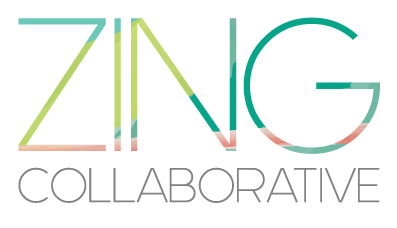Moving Through the Colored Spectrum: A Perspective on Navigating Loss
Transitioning away from something that is, or has been, dear to us - whether our choice or theirs, expected or unexpected, sudden or gradual - can be challenging, painful, and difficult.
Leaving a job, leaving a relationship, leaving a city, leaving a friendship.
Whether we put in our notice in six months ago, or found out about the termination this morning before being walked to the door.
Whether we carefully planned the break-up and followed the methods of conscious uncoupling or were suddenly “dumped” shockingly and unkindly.
Whether we wanted it to end or not.
Whether it had run its course or not.
Whether ultimately it was better to leave or not.
Transitions, departures, and endings can be challenging, painful, and difficult.
We are often quick to rush along - what’s next?
How many resumes should I send out?
How many dating apps should I sign up for?
How many things can I put on my calendar to fill the time and fill the space?
How can I prove to the world that I’m “okay?” That I’m thriving in this new phase? That I’m better off without them anyway?
How can I make sure that my new job is better, pays more, and has a better title?
How can I make sure that my new start-up gets more funding and has more employees?
How can I make sure that my new relationship is more Instagrammable, with captions that we are so happy and so perfect for each other and that I think I’ve found my person?
How can I make sure that I take plenty of photos in my new city, to prove to the world that the move was, indeed, the right one?
To think these things - to do these things - is natural, normal, logical.
It is completely human.
And, oftentimes before taking action, before rushing along, before filling the space... it can be helpful to give ourselves a moment (or a week, a month or a year) to move through the spectrum of feelings and emotions that we’re facing at our own pace, in our own time.
When I first left my job in 2013 to start my business, I couldn’t figure out why everything related to my former company felt so “hot.” I had decided to leave, I had decided to start my business, and I was crystal clear - on a deeply intuitive level - that this was what I was called to do.
And yet, whenever I was about to share something about my new business, I had this overwhelming vision of one specific individual in their office seeing whatever it was that I was about to share, laughing, sneering, and calling in a few other colleagues to join in on the mockery. As I write this now, of course it sounds absurd. And, at the time, the vision was so overwhelming that it often stopped me in my tracks from creating, sharing, or taking action. It would keep me awake at night.
When I ran into former colleagues who were acquaintances versus close friends, I frequently received the question, “so are you, like, a life coach now?” The tone of the question was anything but curious. During these conversations, there was part of me that felt ashamed for doing this new thing that I was doing - a thing that not many people understood, and a thing that was so wildly different than the thing I was doing before.
In these moments, my face would feel hot, my breathing would become shallow, and my heart would begin to beat faster. This feeling came and went for at least a year after leaving my job and starting my business.
“Why is it that I feel this way?” I asked my first coach - an amazing human who has been a wildly important part of my journey over this last decade. “I made the choice to leave. I am so clear that starting this business is the right next step. And yet, this feeling persists.”
In that moment, she shared with me an illustration that I will never forget - one that I, in turn, use regularly with my clients today.
“Sarah,” she said. “It’s like you’re moving through a colored spectrum. You’re currently in the red. Moving through the rest of the spectrum will take time.”
This simple statement changed everything for me. It gave me a visual that perfectly captured the way I felt. It gave me hope that after red comes orange, then yellow, then eventually green. And it provided a reminder that moving through transitions - and the emotions that go along with them - takes time.
Today, I find the same to be true with my clients. Whether a planned departure, a retirement - early or planned, an unexpected termination or lay-off, the end of a relationship, or even the end of a friendship, we all need to move through the colored spectrum at our own pace.
Here are a few questions to reflect on if you suspect that you, also, might be somewhere on this red/yellow/green spectrum as you navigate a transition in your world.
Where am I right now? If I were to plot myself on the image above, where would I put myself?
What could it look like to give myself grace and time to be where I am on the spectrum, without trying to “rush to the green?”
In what ways might I be trying to “rush to the green” to prove something - to myself, or to others?
What can it look like to slow down and feel the feelings of where I’m at right now?
What is one small thing that helps me to feel a bit more “green” than “red?” What can it look like to do this small thing each day?
If you are somewhere in the red or the orange right now following a recent transition, please know that I’m thinking of you. As you have probably gathered through the above text, I understand and empathize with what you’re feeling, and I know that this is an incredibly tender time.
A couple of years ago, a dear client taught me the term “disenfranchised grief” - grief that is often not recognized or honored by our society. While we tend to think that the loss of a spouse, parent, or family member “counts” as something to grieve, we often forget that losing a job - along with the loss of being part of a company, a community of colleagues, and having a clear sense of purpose each day - counts as significant loss, as well. So does the loss of a relationship, a friendship, and even a neighborhood.
Please know, also, that you are not alone. Transitions - whether planned or unplanned; “right” or “wrong;” our choice or theirs - can be painful. We need to let ourselves grieve the loss. And grieving takes time.
For further reading:
Finding Meaning by David Kessler (Buy on Bookshop to benefit local bookstores, or on Amazon)
On Grief and Grieving by Elisabeth Kubler-Ross, M.D. and David Kessler (Bookshop Link; Amazon Link)
Conscious Uncoupling by Kathryn Woodward Thomas (Bookshop Link; Amazon Link)
The Power of Purpose by Richard Leider (Bookshop Link; Amazon Link)
Life Reimagined by Richard Leider (Bookshop Link; Amazon Link) and Work Reimagined, also by Richard Leider (Bookshop Link; Amazon Link)

